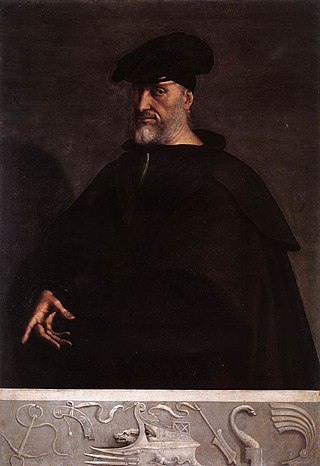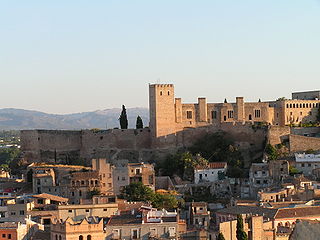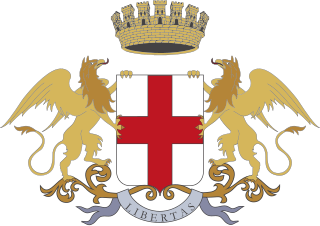Related Research Articles

Andrea Doria, Prince of Melfi was a Genoese statesman, condottiero, and admiral, who played a key role in the Republic of Genoa during his lifetime.

The Republic of Genoa was a medieval and early modern maritime republic from the 11th century to 1797 in Liguria on the northwestern Italian coast. During the Late Middle Ages, it was a major commercial power in both the Mediterranean Sea and the Black Sea. Between the 16th and 17th centuries, it was one of the major financial centers in Europe.

The House of Doria originally de Auria, meaning "the sons of Auria", and then de Oria or d'Oria, is an old and extremely wealthy Genoese family who played a major role in the history of the Republic of Genoa and in Italy, from the 12th century to the 16th century. Numerous members of the dynasty ruled the republic first as Capitano del popolo and later as Doge.

Sampierdarena is a major port and industrial area of Genoa, in northwest Italy. With San Teodoro it forms the West Central municipio.

Genoa, Italy, has historically been one of the most important ports on the Mediterranean.

Guglielmo Embriaco, was a Genoese merchant and military leader who came to the assistance of the Crusader States in the aftermath of the First Crusade. Embriaco is considered one of the founders of what would become the Republic of Genoa.
Guglielmo Grasso, sometimes anglicized William Grassus, was a Genoese merchant, pirate and admiral.
Simone or Simon Doria was a Genoese merchant, politician, and admiral, a member of the powerful Doria family. He was the son of Ansaldo Doria and Anna Grimaldi. He was elected consul six times between 1175 and 1188. Having been elected admiral in 1189, he led a naval fleet in support of the troops of Philip Augustus at the Siege of Acre in 1190. In 1219 he led the Genoese fleet in the Siege of Damietta. He left three known sons: Andrea, who married into the ruling family of Logudoro; Pietro, who fought with his father at Damietta; and Niccolò.

The House of Spìnola, or Spìnola family, was a leading Italian political family centered in the Republic of Genoa. Their influence was at its greatest extent in the thirteenth and fourteenth centuries.
Oberto D'Oria was an Italian politician and admiral of the Republic of Genoa, ruling the republic as Capitano del popolo.
Otto de Bonvillano was a citizen of the Republic of Genoa and a colonial administrator. The principal source for his life and activities is Cafarus’ Ystoria captionis Almarie et Turtuose.

The House of Doria Pamphilj Landi was a princely Roman family of Genoese extraction. Legend has it that the origins of the Doria family date from the early 11th century, but the authentic pedigree is traced to Ansaldo d'Oria, consul of Genoa in the 12th century. The descent of the several Doria family lines in Genoa is well-known and is described in Natale Battilana's 19th-century genealogical study of old Genoese families.

Patrician Marco Doria, Marquis and Count of Montaldeo is an Italian academic and politician from Genoa. He served as Mayor of Genoa from 2012 to 2017.
Doria or Dória may refer to:

Genoa is a city in and the capital of the Italian region of Liguria, and the sixth-largest city in Italy. In 2023, 558,745 people lived within the city's administrative limits. While its metropolitan area has 813,626 inhabitants, more than 1.5 million people live in the wider metropolitan area stretching along the Italian Riviera.

The siege of Tortosa was a military action of the Second Crusade (1147–49) in Spain. A multinational force under the command of Count Raymond Berengar IV of Barcelona besieged the city of Tortosa, then a part of the Almoravid Emirate, for six months before the garrison surrendered.
The siege of Almería by the Kingdom of León and Castile and its allies lasted from July until October 1147. The siege was successful and the Almoravid garrison surrendered. The besieging force was under the overall command of King Alfonso VII. He was supported by forces from Navarre under their king, Catalonia under the count of Barcelona and Genoa, which provided most of the naval force.
Ansaldo is an Italian name of Germanic origin. It was originally a masculine given name and was later also used as a surname.

Spinetta Fregoso was the 35th Doge of the Republic of Genoa.
Simone Guercio was a Genoese noble and military commander and official in the service of the Republic of Genoa during the third quarter of the 13th century.
References
- 1 2 "DORIA, Ansaldo" (in Italian). Retrieved 2 Jan 2018.
- ↑ Epstein, Steven A. (2001). Genoa and the Genoese, 958–1528. Chapel Hill, NC: University of North Carolina Press. p. 50.
- ↑ Johnson, Virginia W. (1892). Genoa the superb, the city of Columbus. Boston: Estes and Lauriat. p. 135.